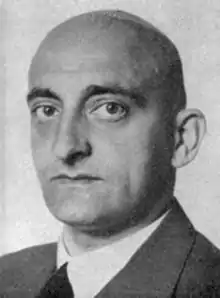Erich Neumann (politician)
Erich Neumann (31 May 1892[1] – 23 March 1951[1]) was a German politician and civil servant, a member of the Nazi party and SS-Oberführer. Neumann was a participant in the Wannsee Conference that discussed plans for the Final Solution.
Erich Neumann | |
|---|---|
 | |
| State Secretary Four Year Plan | |
| In office 23 July 1938 – August 1942 | |
| Personal details | |
| Born | 31 May 1892 Forst, Province of Brandenburg, Kingdom of Prussia, German Empire |
| Died | 23 March 1951 (aged 58) Garmisch-Partenkirchen, Bavaria, West Germany |
| Nationality | German |
| Political party | Nazi Party (NSDAP) |
| Other political affiliations | German National People's Party |
| Alma mater | University of Freiburg, University of Leipzig, University of Halle-Wittenberg |
| Occupation | Civil servant |
| Military service | |
| Allegiance | |
| Branch/service | Imperial German Army Schutzstaffel (SS) |
| Years of service | 1914–1917 1934–1945 |
| Rank | Leutnant SS-Oberführer |
| Battles/wars | World War I |
Early life
Neumann was born in Forst (Lausitz) into a Protestant family. His father was a factory owner.[2] After receiving his Abitur, Neumann studied law and economics at the universities of Freiburg, Leipzig and Halle. He served in World War I and reached the rank of Leutnant before being discharged due to a severe hand wound.[3] In 1920, he served as governmental civil servant (Regierungsassessor) in the Prussian Ministry of the Interior, and thereafter in the Essen District Office.
Neumann became a Government Counselor (Regierungsrat) in the Prussian Ministry of Commerce in 1923.[1][2] From 1926 to 1928, he became District President (Landrat) in Freystadt (Lower Silesia), then served as Ministerial Junior Assistant Secretary (Ministerialrat) again in the Prussian Ministry of Commerce. In September 1932, he was appointed Permanent Secretary (Ministerialdirektor) to the Prussian State Ministry, where he was in charge of administrative reforms.[2]
Career in Nazi Germany
Shortly after the Adolf Hitler's seizure of power, Neumann was made a deputy plenipotentiary to the Reichsrat for Prussia on 11 February 1933, where he served until its abolition on 14 February 1934. Formerly a member of the German National People's Party, Neumann joined the Nazi Party in May 1933 (membership number 2,645,024). On 15 September of that year, he was appointed to the Prussian State Council by Prussian Minister President Hermann Göring and served as its secretary until 1942. In October 1933, he became a founding member of Hans Frank's Academy for German Law.[3]
Neumann joined the SS (SS number 222,014) in August 1934, being commissioned as a Major (Sturmbannführer).[1][2] He would attain the rank of SS-Oberführer on 30 January 1939 and be assigned to the personal staff of Reichsführer-SS Heinrich Himmler.[3]
In October 1936, Neumann was appointed the director of the Foreign Currency Department of the Office of the Plenipotentiary for the Four Year Plan, headed by Göring. On 23 July 1938, Neumann was promoted to State Secretary and Deputy to Paul Körner, Göring's chief deputy in the Four Year Plan. Neumann attended Göring's meeting about the "Aryanisation" of the German economy. He was a member of the Economic Management Plan East (Wirtschaftsführungsstab Ost) in 1941 and 1942 that planned for the economic exploitation of the Soviet Union.[3] As State Secretary, Neumann was the official representative of the Four Year Plan at the January 1942 Wannsee Conference, at which the genocidal Final Solution to the Jewish Question was planned. Neumann requested that Jewish workers in firms essential to the war effort not be deported for the time being. Between August 1942 and May 1945, Neumann was the General Director of Deutsches Kalisyndikat, the German Potassium Syndicate.
He was interned and interrogated by the Allies in 1945 after the war but released due to poor health in 1948.[1][2] According to the German Federal Archives, Neumann died three years later in Garmisch-Partenkirchen, on 23 March 1951.[1][2]
References
- "Erich Neumann Biographie". German Federal Archives (in German). Retrieved 3 April 2010.
- "Die Teilnehmer an der Konferenz". Haus der Wannsee Konferenz (in German). Archived from the original on 30 January 2010. Retrieved 3 April 2010.
- Lilla, Joachim (2005). Der Prußische Staatsrat 1921–1933: Ein biographisches Handbuch. Düsseldorf: Droste Verlag. pp. 227–228. ISBN 978-3-770-05271-4.